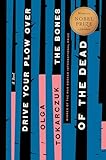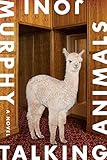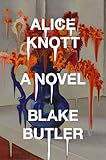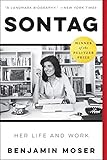In this year of accursed years, whose events have unfurled like bad writing for a television series that went off the rails a few seasons back and I would’ve ditched if we weren’t living it, I am indebted to the authors and books that offered solace, refuge, a safe harbor. The books that shepherded me through the tumultuous news cycle, provided companionship through the pandemic, while trying to reckon with the unjust killings of George Floyd and Breonna Taylor and too many others, and the slew of other dreadful happenings that marked this year. I’m beholden to the books that enticed me to think harder, to be present, the books that convinced me again and again there are worse things than solitude, books whose language, vitality, and mindfuckery made me feel alive, still, and grateful to be so, mostly.


 Here’s to Thomas Bernhard, that old wonderful curmudgeon whose misanthropy charmed me once again, this time with his novel The Woodcutters. Through itI was able to revisit dinner parties, the kind attended by the high society artists and poseurs, while through Bernhard’s caustic lens I was reminded of the many ways these parties can also be loathsome. Rereading Amina Cain’s Indelicacy just before lockdown, (our conversation published here), I was reminded of how art and isolation can feed the imagination. It’s a meditative book, and one that offers space to think alongside its narrative, the dialectical opposite of a Twitter feed. In Olga Tokarczuk’s Drive Your Plow Over the Bones of the Dead, the willfully independent and curious-minded Janina has a profound understanding and sympathy with nature, something I identified with more as I intently watched the squirrels outside my window and started throwing quinoa on the sill to lure the house sparrows closer. Janina despises the ways men around her kill animals for sport, and, as the reader eventually discovers, she retaliates in an Old Testament kind of way. (As an aside, I’d like to send Eric and Don Jr. to live in her village.) Yuri Herrera’s Signs Preceding the End of the World has the most apt title for a book read this year — like the four horsemen of the apocalypse—except that it borrows its signs from Aztec mythology, the descent into its afterworld can be read literally and metaphorically. It’s relevant too for its border crossings, the perils of doing so, the ways illegal immigrants in this country are used and then treated as less than human.
Here’s to Thomas Bernhard, that old wonderful curmudgeon whose misanthropy charmed me once again, this time with his novel The Woodcutters. Through itI was able to revisit dinner parties, the kind attended by the high society artists and poseurs, while through Bernhard’s caustic lens I was reminded of the many ways these parties can also be loathsome. Rereading Amina Cain’s Indelicacy just before lockdown, (our conversation published here), I was reminded of how art and isolation can feed the imagination. It’s a meditative book, and one that offers space to think alongside its narrative, the dialectical opposite of a Twitter feed. In Olga Tokarczuk’s Drive Your Plow Over the Bones of the Dead, the willfully independent and curious-minded Janina has a profound understanding and sympathy with nature, something I identified with more as I intently watched the squirrels outside my window and started throwing quinoa on the sill to lure the house sparrows closer. Janina despises the ways men around her kill animals for sport, and, as the reader eventually discovers, she retaliates in an Old Testament kind of way. (As an aside, I’d like to send Eric and Don Jr. to live in her village.) Yuri Herrera’s Signs Preceding the End of the World has the most apt title for a book read this year — like the four horsemen of the apocalypse—except that it borrows its signs from Aztec mythology, the descent into its afterworld can be read literally and metaphorically. It’s relevant too for its border crossings, the perils of doing so, the ways illegal immigrants in this country are used and then treated as less than human.

 To Cuban poet Lena Rodríguez Iglesias whose fire and obstinancy in Kenning Editions’ bilingual collection, Título, invigorated me with its poetics of ugliness, its fuck you to so many oppressive systems, its inherent iconoclasm. I’m not sure how such frenzy can be contained within its pages. Poet Olivia Cronk’s book Womonster is seductive, repulsive, and subversive simultaneously; I adore it for its admiration and troubling of female desire, the female performative, while asking, why are we drawn to it? (because it’s so enchanting, iconic, and yet… ) To Joni Murphy and her Talking Animals, which pokes fun at academia and bureaucracy and the anthropocene with its vision of a New York City run by animals, all while taking seriously the threats of climate change and late stage capitalism. To Blake Butler’s Alice Knott, which somehow navigates a Gordian knot of life, simulacra, surveillance, the troubling of memory and its gaps, in way that’s both coherent and mind-boggling. The result is the novelistic love child of David Lynch’s third season of Twin Peaks and David Bowie’s concept album Outside; it’s truly just as strange and wonderful and hallucinatory.
To Cuban poet Lena Rodríguez Iglesias whose fire and obstinancy in Kenning Editions’ bilingual collection, Título, invigorated me with its poetics of ugliness, its fuck you to so many oppressive systems, its inherent iconoclasm. I’m not sure how such frenzy can be contained within its pages. Poet Olivia Cronk’s book Womonster is seductive, repulsive, and subversive simultaneously; I adore it for its admiration and troubling of female desire, the female performative, while asking, why are we drawn to it? (because it’s so enchanting, iconic, and yet… ) To Joni Murphy and her Talking Animals, which pokes fun at academia and bureaucracy and the anthropocene with its vision of a New York City run by animals, all while taking seriously the threats of climate change and late stage capitalism. To Blake Butler’s Alice Knott, which somehow navigates a Gordian knot of life, simulacra, surveillance, the troubling of memory and its gaps, in way that’s both coherent and mind-boggling. The result is the novelistic love child of David Lynch’s third season of Twin Peaks and David Bowie’s concept album Outside; it’s truly just as strange and wonderful and hallucinatory.
To audiobooks, and to Libro.fm membership, which operates much like its competition, but instead of patronizing amazon you’re buying from an independent bookstore. Once I was working from home, audiobooks helped offset the monotony of a workday passed before screens, and with little human engagement. I devoured all twenty-two hours Benjamin Moser’s epic biography Sontag: Her Work and Life in little over a week. It convinced me that Sontag was feline — and lived at least nine lives, and was at the center of intellectual life in more ways than seem humanly possible. The book is wondrous and epic in its compiling, though it’s also problematic when Moser’s inferences read like forensic psychoanalysis. Deborah Levy‘s The Man Who Saw Everything, was a masterful and enticing listen, with its taut sexuality, its depiction of tensions about establishing identity, its instability, and how the past is always with us. The highly religious household in Marieke Lucas Rijneveld’s Discomfort of Evening is even more accursed than most of us. It starts when the young Jas’s brother falls through the ice while skating and dies, and in doing so the guilt-ridden Jas, effectively loses any stability of her household: her depressed mother withdraws, her father retreats, and she’s left with her two siblings to find her way through her own guilt while ultimately seeking escape. As a child narrator Jas’s depth of darkness and expansive imagination are remarkably vivid.
And last but not least, here’s to the books (and their authors) that I spent the most time with this year, books dear to me for having edited them, for having ushered them from mansucript to printed, perfect bound book published via Meekling Press, the small press I co-run in Chicago. In retrospect, it seems like a feat that despite the year’s setbacks we made three books of fiction and released them this fall. I’m not exagerating when I say I’ve come to admire these books more with each read: Kater Wyer’s deeply embodied and lyric pair of interlinked novellas in Girl, Cow, and Monk, Willy Smart’s erotic novel in disguise, Switch Wish and Marream Krollos’s voice-driven Stan, its narrator rewrites herself into being from her humiliations and the wounds of her desire.
More from A Year in Reading 2020
Don’t miss: A Year in Reading 2019, 2018, 2017, 2016, 2015, 2014, 2013, 2012, 2011, 2010, 2009, 2008, 2007, 2006, 2005















